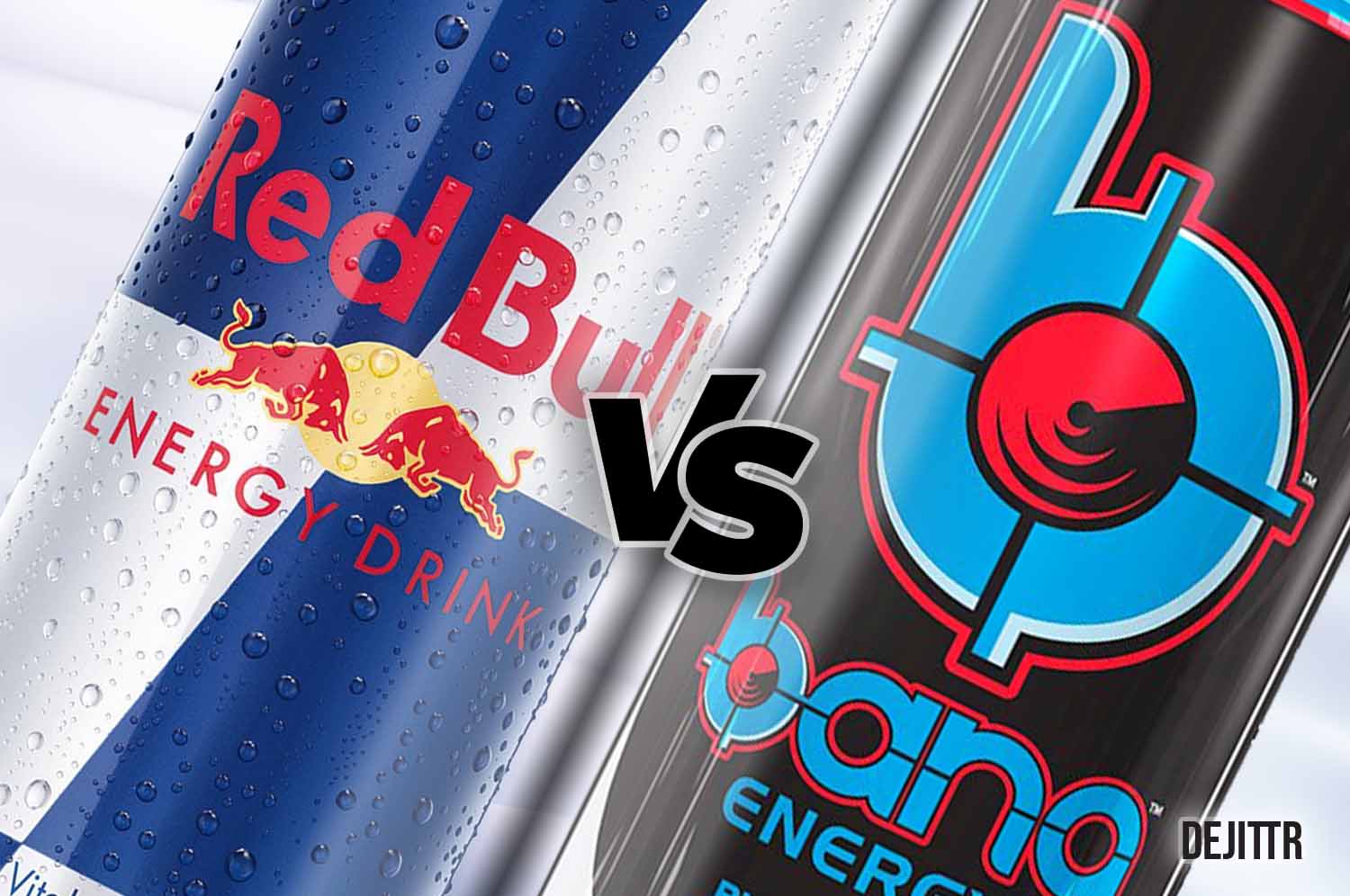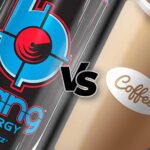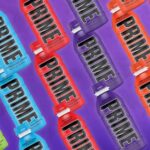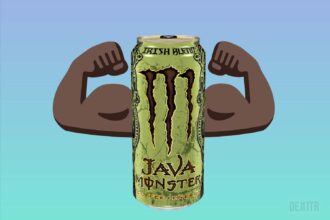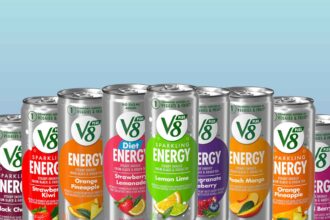Sometimes, two products in the same market are branded so differently that it is hard to think of them as belonging to the same category. Red Bull and Bang Energy are so different in their packaging and marketing that one might never consider comparing them. Still, they are both energy drinks despite all their differences.
The main difference between Red Bull and Bang Energy is that Bang has a much higher caffeine content than Red Bull. Bang contains zero sugar and zero calories, while Red Bull original has 220 calories in each simular sized can. Red Bull’s caffeine content is safer for daily consumption, while Bang is ideal for a one-off jolt.
In this article, we will compare and contrast the two energy drinks to see how they fare against each other. You will discover Red Bull’s and Bang Energy’s relative pros and cons and will find out which one is best for you under different circumstances. By the end, you’ll know whether to pick a 6-pack of Red Bull or Bang Energy.
But first, let’s compare Red Bull vs. Bang Energy at a glance:
| Based on a 473 mL can | Red Bull | Bang Energy |
| Caffeine | 151 mg | 300 mg |
| Sugar | 51 g | 0 g |
| Calories | 220 | 0 |
| Taurine | 1892 | 0 g |
| Best Use | One-off energy boost | One-off energy boost |
| Creatine | No | Yes |
Red Bull: A Brief Overview
Here are the most notable Red Bull ingredients:
- Caffeine
- Sucrose
- Glucose
- Carbonated Water
- Vitamin B12
- Taurine
- Artificial and Natural Flavors and Colors
- Does Red Bull contain creatine? No
You simply can’t talk about energy drinks without mentioning Red Bull.
The product was the first in its category and created the energy drink market. This fact is relevant for two reasons in any comparative post.
Firstly, the headstart that Red Bull got accounts for most of its popularity. The popularity of two average energy drinks can be compared, and the more popular one can be considered tastier. But the same logic doesn’t apply to Red Bull because it has a legacy status that keeps it popular.
The second reason Red Bull’s position in the market is worth noting is that the beverage was most scrutinized. As a market leader, it had to be (and still is) careful.
Many energy drinks have a higher caffeine volume per can than Red Bull. But Red Bull remains one of the most balanced energy drinks on the market.
Let’s look at the pros and cons of Red Bull.
Red Bull – Pros
Red Bull has many perks, most of which are also pros of Bang Energy since both the beverages are energy drinks. Here, we explore the specific advantages of Red Bull that are absent from Bang Energy or valid to a lesser degree in other beverages.
Safe for the Average Adult
Red Bull is an energy drink that refuses to participate in the caffeine max-out race that Monster Energy leads and Bang Energy engages in. When other energy drinks couldn’t find an advantage to offset Red Bull’s position as the creator of the Energy Drink market, they decided to one-up the beverage by adding more caffeine.
Red Bull didn’t give in to the pressure and put consumer safety first.
While other drinks have containers that can reach the maximum permitted caffeine intake, Red Bull keeps its caffeine content within the 400 mg caffeine per day allowance.
There are 80 milligrams of caffeine in one standard can of Red Bull (barely above the average espresso). Contrast that with Bang Energy which has 300 mg of caffeine in a single serving, and you can see why Red Bull is safer.
The question is whether Red Bull is less effective because of less caffeine. And the answer is that, to some extent, Red Bull’s caffeine limit hinders its performance. But that’s only for people with through-the-roof caffeine tolerance.
For the average Joe, most caffeine over 80 to 90 milligrams has no receptors to latch onto. Your body limits how much caffeine it can entertain, and Red Bull might have found the magic number.
Readily Available
Red Bull is available nationally and internationally, and even the Edition flavors are distributed globally. When we consume a beverage daily for alertness or athletic performance, we form a habit around its taste market.
This habit is called a physiological signature and is as important as caffeine. Both Red Bull and Bang Energy are habit-forming beverages. If you choose to use Bang as your energy drink of choice, you might miss it while traveling.
If you choose Red Bull, there is no chance you’ll be a store trip away from your next can, no matter which state you’re in.
Socially Acceptable
Bang Energy has used loud marketing and controversial tactics to get attention. Despite having more caffeine than Red Bull, Bang Energy is seen as childish.
On the other hand, Red Bull is more socially acceptable.
Red Bull is considered a “grown-up” drink and respected in a corporate environment and social gatherings.
This branding choice is deliberate and gender-neutral to keep the drink from getting stereotyped. Bang Energy can communicate unflattering things about the kind of brands that attract you.
Red Bull – Cons
Red Bull has all the drawbacks of the average energy drink. But when you compare it with Bang Energy, you find that only situational disadvantages apply.
Here are the specific cons of Red Bull relative to Bang Energy.
It Contains Sugar
Red Bull’s most significant point of contrast with Bang Energy, aside from the caffeine volume, is that it contains sugar. Bang Energy might overcaffeinate you, but it will not introduce sugar to your bloodstream.
Red Bull contains 37 grams of sugar in its 12-ounce can and 49 grams in the 16-ounce one. That’s like 9 teaspoons of sugar in the small cans of Red Bull and 12 teaspoons in the large one. In contrast, Bang Energy contains zero sugar.
There’s a flip side to this, though…
Classic energy drink formula combines caffeine with a simple carb like sugar to boost immediate energy. Sugar adds energy to the system, and caffeine makes it instantly accessible. Red Bull has a zero sugar version that doesn’t have the same drawback. But it also doesn’t have the same kind of kick.
Safe for the Average Adult
Red Bull packs 168 calories in its small can, while Bang contains zero calories. This makes Bang Energy more appealing to people trying to lose weight. But if you’re OK with Red Bull zero sugar, you might not need to switch brands.
The calorie disadvantage applies to Red Bull classic and Red Bull Edition beverages but not to the sugar-free version of the drink. The sky blue can contains zero sugar and only 13 calories, which is 13 more than Bang Energy but not enough to cause weight gain. This point is a technical win for Bang Energy.
It Doesn’t Contain as Much Caffeine
This situation drawback is valid for anyone who drinks more than 2 cups of coffee.
Red Bull has enough caffeine to energize the average consumer. But habitual coffee drinkers or those who consume other energy drinks for focus and alertness will find Red Bull suboptimal.
If your caffeine tolerance is higher, you might need two cans of Red Bull where a single can of Bang Energy can do the job. Your satisfaction (or dissatisfaction) with Red Bull is tied to appropriate use.
Red Bull Best Use(s), Ideal Audience Profile, etc.
Red Bull can be used to replace coffee or to kick an energy drink habit.
Red Bull can help reduce caffeine dependence because it contains less caffeine than other popular energy drinks like Monster Energy and Bang Energy. If you’re addicted to either one or drink two cups of coffee in the morning, you can opt for Red Bull as a caffeine step-down.
Red Bull is a consumer-conscious brand that doesn’t exploit the 400mg caffeine allowance to turn consumers into addicts. It refuses to produce cans that max out your allowed daily caffeine intake, which means it can be consumed on the same day you drink coffee.
This makes it an acceptable “quick-fix” solution.
If you have a big event or a game you want to be energized for, you can drink Red Bull without much thought regarding the coffee you had in the morning.
You might have to sit with a calculator and account for all the caffeine you had on a specific day before you can drink Bang Energy.
Bang Energy: A Brief Overview
These are the most notable ingredients in Bang Energy:
- Carbonated water
- caffeine
- EAAs
- sucralose
- Super Creatine
- B Group Vitamins
Bang Energy is the third most popular energy drink in the United States, which can be attributed to taste and marketing.
Since Bang didn’t have the headstart that Red Bull had, it coming even third in the popularity contest shows that the drink has something other than its chronology.
Its bold marketing seems to get attention on a budget, but its growth trend shows that the people who try Bang Energy like it enough to stick around as regular consumers.
Bang Energy – Pros
Bang Energy often gets dismissed because of its eccentric marketing that shows content creators pulling pranks on each other with a can of Bang Energy in the foreground. However, Bang offers more than a “fun-loving and easy-going” identity. Here are the advantages of Bang Energy.
It Can Help You Focus and Be Alert
Red Bull can help you focus, but Bang Energy can really help you focus.
The difference between both the beverages’ caffeine content shows as a single can of Bang Energy can help you pull off an all-nighter. That said, if you’re not used to caffeine, you can have the same effect studying with a can of Red Bull or a cup of coffee.
Bang delivers its biggest Bang for caffeine lovers.
Energizes You Instantly
Caffeine energizes you by promoting the breakdown of simple carbs. Since Bang Energy doesn’t contain sugar, it helps you make the most of the sugar and carbs in your system.
Bang has more than four times the caffeine in a 12-ounce Red Bull and not even one percent of its sugar.
Cancels Out Caffeine Tolerance
Red Bull and coffee can be consumed habitually, so caffeine tolerance can develop around the 80 mg mark.
If a cup of coffee doesn’t work, you probably need a higher dose of caffeine. And Bang Energy has enough caffeine to awaken even the most habitual energy drink consumer.
Doesn’t Contribute to Weight Gain
For an energy drink known for its excess, Bang is surprisingly careful about its calorie contents.
Bang Energy’s main product line is sugar-free because most energy drinks have special sugar-free versions. Red Bull’s sugar-free variety has 13 calories, while Bang Energy contains zero calories. This makes Bang Energy a good choice for those watching their weight.
It Is Available in a Variety of Flavors
This benefit is subjective but an advantage nonetheless. Red Bull has 6 Edition Flavors alongside its main beverage, while Bang Energy has over 30 flavors.
If you love variety but don’t want your caffeine intake to fluctuate when switching brands, you should drink Bang Energy. You can drink a different flavor daily and still not run out in a month.
Bang Energy – Cons
Where there are advantages, there must also be disadvantages. All the drawbacks of classic energy drinks are more emphasized with Bang Energy.
Here are the disadvantages of consistently drinking Bang Energy.
It Builds up a Caffeine Tolerance
While 300 mg of caffeine can give one a prolonged boost in mental function and physical energy, a caffeine crash follows. And the higher a peak, the harder one falls from it.
Bang Energy can leave an individual wanting more. And you can only have more the next day. Ultimately, this can result in addiction.
It Is Expensive
Bang Energy costs more per ounce compared to Red Bull. This is due to economies of scale.
Red Bull produces enough units to afford to charge less per can. Bang is an energy drink giant but hasn’t reached a stage where it can compete with Red Bull on price alone.
You Can Overdose on It
This drawback is the most serious for Bang Energy. It tries to max out the caffeine that an adult human can consume in a day.
It contains 300 mg of caffeine, while 400 mg is the safe consumption maximum. That means drinking two Bang drinks puts you squarely over the safe consumption limit for caffeine.
Bang Energy Best Use(s), Ideal Audience Profile, etc.
Bang Energy is a good energy drink to consume as a one-off on a special day where you need maximum energy and focus.
It doesn’t cause weight gain but can desensitize you to caffeine, so consume with caution!
Recap: Is Bang Energy or Red Bull For You?
Red Bull and Bang Energy have their respective places on the energy drink roster.
Where Bang is good for fitness, Red Bull is better for one’s overall caffeine sensitivity. Among the two, Red Bull is safer for daily consumption, but Bang Energy packs a bigger punch.


